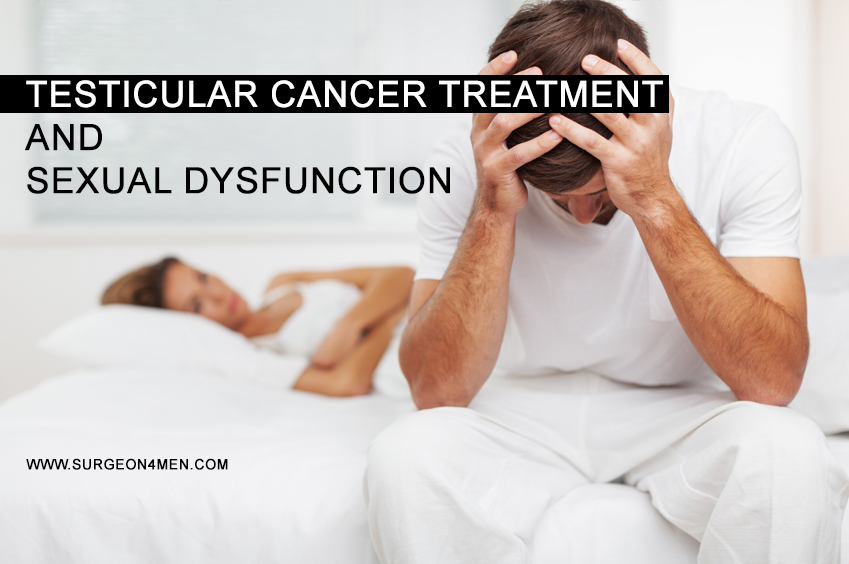Testicular Cancer Treatment And Sexual Dysfunction
Testicular malignancy is the most frequently reported cancer in young or middle-aged males. Certain risk factors that can aggravate the risk of developing testicular cancer are; undescended testis (also referred to as cryptorchidism), exposure to radiations and personal/ family history of testicular cancer. The most frequently reported type of testicular cancers are germ cell tumors, which includes:
- Seminomas: If detected early and treated adequately, the cure rate is as high as 90%.
- Nonseminomas: With early detection and treatment, almost 100% patients achieve cancer free survival.
With advanced diagnostic and therapeutic tools, most cases of testicular cancer are adequately managed and treated. However, it is imperative to mention that the therapy is associated with some adverse effects.
How To Treat Testicular Cancer?
According to latest estimates, 8,720 new cases of testicular malignancy will be diagnosed in the United States in 2016. Regardless of the increasing number of cases, the overall survival and quality of life is generally satisfactory in these patients. This is mainly attributed to the advanced treatment options that are available today. The treatment modalities depends largely on the age, size of tumor, histological variety/ extent of cancer involvement, and patient preferences.
Common options are:
1. Surgery: For localized disease, doctors usually advice surgical intervention which involves orchiectomy (removal of one or both testicles). In some cases, removal of surrounding lymph nodes is also important.
2. Non-Surgical Treatments: For advanced disease, pharmacological regimen is generally preferred. This includes:
- Chemotherapy: BEP therapy (or Bleomycin, Etoposide and Cisplatin) is highly effective at specifically killing cancerous cells.
- Radiation Therapy: Powerful radioactive waves can also be used as a preferred therapy to kill cancer cells.
In some patients with advanced disease, more than one form of therapy can be employed to achieve desired results.
Sexual Dysfunction And Testicular Cancer Treatment
It has been observed that a significant percentage of patients develops moderate to severe sexual dysfunction with testicular cancer treatment. According to a study reported in the British Journal of Urology (2), investigators reported the results of a study conducted on 79 men (mean age – 29 years) who underwent a variety of treatments for the management of testicular cancer.
After the completion of study, it was observed that:
- About 84% patients experienced moderate to severe erectile dysfunction
- The serum testosterone levels in 26% of the patient population was found to be less than 300 mg/dL.
Other common sexual disorders that are very frequently reported in males suffering from testicular cancer are:
- Increased sexual discomfort
- Lack of sexual interest
- Inability to enjoy sexual encounters as much erectile dysfunction (ED)
- Overall low frequency of sexual activity
What Causes Sexual Dysfunction In Males Undergoing Treatment?
There are several explanations; for example:
- Sexual Dysfunction is caused by the Cancer itself: It is noteworthy that cancer affects the capacity of normal testicular tissue to produce testosterone and maintain other sexual functions. Growing cancer may also invade blood vessels or affects the nerve functions. According to rough estimates, about 14 to 30% patients have some degree of sexual dysfunction at the time of diagnosis.
- Psychological sexual dysfunction due to poor body image: Some males perceive testicular health as a measure of their manhood. After the diagnosis of testicular cancer, a lot of men develops low self-esteem and poor body image. Other psychological causes include depression, anxiety and altered feeling of well-being.
- Therapy related side-effects: Depending upon the type of therapy, the severity of sexual dysfunction varies. For example, according to a new study reported in the ASCO Annual Meeting Proceedings (4), investigators suggested that the treatment of testicular cancer with cisplatin increases the risk of developing metabolic syndrome by up to three times. Based on the results of the study that was performed among 1,135 patients undergoing chemotherapy with Cisplatin, about 40% study population developed metabolic syndrome. The most common health issues reported in the study sample were hypercholesterolemia (reported in 69% men), followed by other disorders like hypertension (43%), obesity (15%) and Diabetes mellitus (2.3%). It is noteworthy that poorly managed metabolic syndrome can increase the risk of sexual dysfunction several folds. Several clinical studies also indicates that the serum levels of different hormones also decline after chemotherapy or orchiectomy.
But it is possible to maintain satisfactory sexual life after testicular cancer management; here’s how:
- Speak to your doctor before opting for a particular therapy and assess your risk profile with different regimens. This is mainly because, the risk of complications vary from person to person.
- Discuss various management options to restore the normal quality of sex life.
- Keep the communication open with your partner to sort out issues.
References
1. DeSantis, C. E., Lin, C. C., Mariotto, A. B., Siegel, R. L., Stein, K. D., Kramer, J. L., … & Jemal, A. (2014). Cancer treatment and survivorship statistics, 2014. CA: a cancer journal for clinicians, 64(4), 252-271.
2. Tal, R., Stember, D. S., Logmanieh, N., Narus, J., & Mulhall, J. P. (2014). Erectile dysfunction in men treated for testicular cancer. BJU international, 113(6), 907-910.
3. Tasdemir, C., Firdolas, F., Harputluoglu, H., Altintas, R., & Gunes, A. (2012). Erectile dysfunction in testicular cancer patients treated with chemotherapy. Andrologia, 44(4), 226-229.
4. Abu Zaid, M. I., Sesso, H. D., Fung, C., Feldman, D. R., Hamilton, R. J., Vaughn, D. J., … & Fossa, S. (2015, May). Chronic health conditions (CHCs) following cisplatin-based chemotherapy (CHEM): A multi-institutional study of 680 testicular cancer survivors (TCS). In ASCO Annual Meeting Proceedings (Vol. 33, No. 15_suppl, p. 9519).
